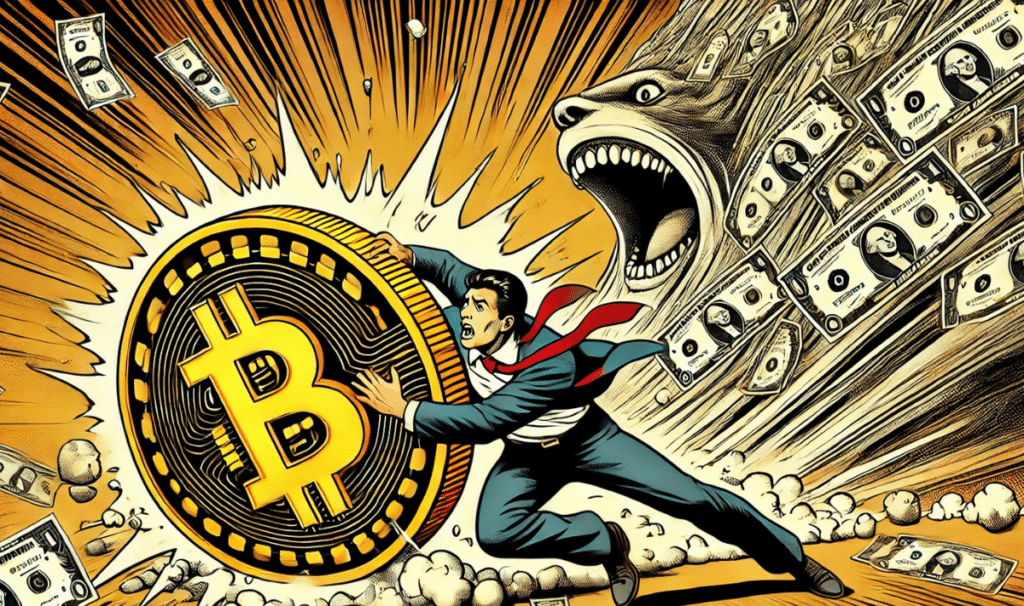
Central banks have been the foundation of global financial stability for more than a century, responsible for controlling interest rates, issuing national currencies, and protecting economies. However, the ascendance of Bitcoin and decentralized cryptocurrencies has disrupted this dominance, resulting in one of the most significant conflicts in modern economic history: **central banks vs. Bitcoin**.
A trillion-dollar ecosystem has emerged from an eccentric experiment in peer-to-peer money. Currently, central banks are being compelled to respond by either resisting, reinventing, or regulating. The destiny of money itself will be influenced by this global regulatory showdown.
Reasons for Central Banks’ Sense of Unease
The fundamental principles of central banking are challenged by Bitcoin and other decentralized cryptocurrencies in a variety of ways:
* **Monetary sovereignty:** Bitcoin operates autonomously, which poses a threat to the monopoly that central banks have over money creation. * **Capital controls:** Cryptocurrency enables the transfer of value across borders without intermediaries, thereby undermining governments’ capacity to regulate capital movements.
* **Inflation resistance:** Bitcoin’s fixed supply is attractive to individuals who are interested in protecting themselves from inflationary fiat currencies. * **Financial disintermediation:** Decentralized finance (DeFi) allows individuals to circumvent banks entirely, thereby diminishing their influence over credit and savings.
Central banks are growing increasingly concerned as crypto adoption increases, particularly in countries that are experiencing inflation, currency devaluation, or financial exclusion.
Central banks react to the global regulatory landscape.
**1. The Aggressors: Complete Crackdowns**
Certain central banks have elected to confront cryptocurrency directly.
* **China:** In 2021, the People’s Bank of China (PBoC) prohibited all crypto transactions and mining activities, declaring them unlawful. Rather, China increased its emphasis on its digital yuan (e-CNY) in order to exert greater control over its financial system.
* **Nigeria:** The Central Bank of Nigeria, citing monetary and anti-money laundering (AML) concerns, prohibited banks from facilitating crypto transactions, despite the high adoption of crypto. The nation is also conducting a pilot program for its own digital currency, the eNaira.
* **Morocco, Algeria, and Bangladesh** have implemented complete or partial prohibitions, frequently citing financial risk and capital flight.
**2. The Regulators: Tolerant but Tight**
Numerous central banks are balancing the need for supervision with the recognition of the potential of crypto.
* **United States:** The Federal Reserve does not actively regulate cryptocurrency; however, it advocates for regulatory clarity. While the Federal Reserve investigates a digital currency (CBDC), agencies such as the Securities and Exchange Commission (SEC) and the Commodity Futures Trading Commission (CFTC) have implemented enforcement actions.
* **European Central Bank (ECB):** The European Central Bank has characterized Bitcoin as “highly speculative” and has advocated for EU-wide regulation. Concurrently, it is in the process of developing the **digital euro**, with the intention of launching it later this decade.
* **Japan:** While conducting public-private pilots to investigate a central bank decentralized digital currency (CBDC), the Bank of Japan has advocated for regulated crypto markets.
**3. The Collaborators: The Art of Innovation**
Blockchain is perceived as an opportunity by a small number of central banks, rather than as a threat.
* **Switzerland:** The Swiss National Bank has promoted innovation by collaborating on the development of blockchain-based financial infrastructure, such as Project Helvetia.
* **Singapore:** The Monetary Authority of Singapore (MAS) is currently conducting a test of blockchain technology for cross-border payments and has authorized regulated crypto services.
* **El Salvador:** While not a central bank-led initiative, El Salvador’s Bitcoin Law, which renders BTC legal tender, compels the central bank to incorporate crypto into the national monetary system.
The Countermove: Central Bank Digital Currencies
Central banks worldwide are rushing to establish **central bank digital currencies (CBDCs)** in response to the escalating popularity of crypto. As of 2025, more than 130 countries are either piloting or investigating CBDCs.
According to CBDCs, they promise:
* **Instant, low-cost transactions** * **Stability backed by the government** * **Enhanced financial inclusion** * **Programmable money with policy tools**
However, critics contend that they could result in:
* **Increased state surveillance** * **Reduced privacy** * **Crowding out private cryptocurrencies**
CBDCs may not eradicate Bitcoin; however, they constitute the most formidable institutional counterattack to date.
The Conflict of Philosophy
The conflict is fundamentally about values:
* **Bitcoin** is a digital alternative to fiat money that is controlled by no one, and it advocates for **decentralization**, **individual sovereignty**, and **limited supply**.
* * **Central banks** are responsible for **trust through institutions**, **policy-driven flexibility**, and **macro-economic management**.
The manner in which future generations perceive money will be determined by this ideological divide: **Should it be regulated by a central authority or by code and consensus?**
What is the subsequent step?
The conflict between central banks and Bitcoin is far from over. In reality, we are currently in the midst of the critical phase. The following are the most significant developments to monitor:
* The global implementation of CBDCs and their potential coexistence—or potential conflict—with cryptocurrency.
* The manner in which crypto enterprises adapt and the clarity of regulatory frameworks.
* The function of Bitcoin as a reserve asset in countries with unstable currencies.
* Whether citizens opt for institutional trust or decentralized freedom.
One thing is certain: **the future of money is being penned now**. The financial revolution is reshaping the world order, one block at a time, regardless of whether central banks, crypto networks, or a combination of both prevail.
**Your opinions are significant:** Central banks will either be compelled to coexist with cryptocurrency or destroy it. Please inform us in the remarks section.
Leave a Reply